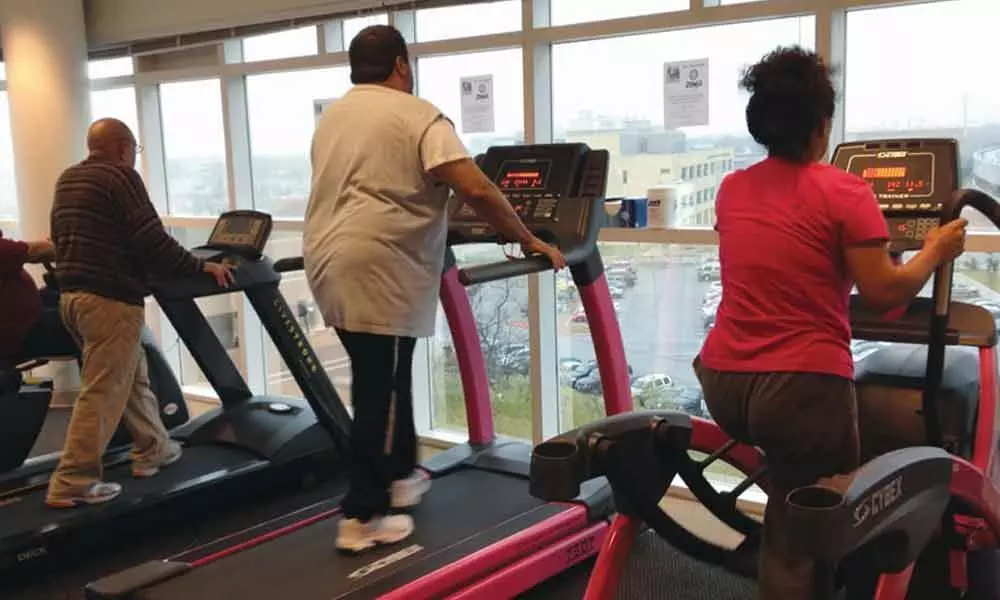Live
- Market Outlook: US bond yields, dollar index, FII data key triggers for next week
- Remembering maths genius Ramanujan
- The Third Eye: Ensuring an efficient governance
- Service activities of Ambica Sishu Kendra hailed
- Help in comprehensive development of Nellore dist
- Death toll in Punjab building collapse rises to two
- Make Christmas celebrations merrier and healthier with California almonds
- A carrom ball that bowled everyone: PM writes to Ashwin on his retirement
- Kashi Math Samsthan seer worships Lord Balaji
- Gold rates in Delhi today stable, check the rates on 22 December, 2024
Just In

Exercise is must for cancer patient's heart: Study.
Washington: Cancer patients, irrespective of their treatment type, must receive a custom exercise prescription to protect their heart, states a study. "Cancer patients are often less active than adults without cancer," said author Dr Flavio D'Ascenzi, University of Siena, Italy. "However, exercise is essential for patients diagnosed with cancer who are under treatment, irrespective of the type of treatment."
"Endurance training is more effective for improving cardiovascular performance and reducing inflammation, but resistance training may be a better starting point for frail cancer patients," explained Dr Flavio D'Ascenzi. "Other types of exercise, such as inspiratory muscle training, are safe and effective, particularly in those with thoracic cancer; therefore, the specific exercise should be chosen based on individual characteristics," he continued.
Cardiovascular diseases are common side effects in patients with cancer. This is the result of cardio-toxicity, whereby cancer treatment impairs heart function and structure, or accelerated development of the cardiovascular disease, especially when risk factors such as high blood pressure are present.
Furthermore, cardiovascular diseases and cancer often share the same risk factors. Therefore, cancer patients are advised to eat healthily, quit smoking, control their weight, and exercise. The study published in the 'European Journal of Preventive Cardiology' highlighted the importance of an individual exercise plan for each patient, taking into account personal history, cancer treatment, response to exercise, and personal preferences.
Exercise should start as soon as possible, even before starting treatment such as chemotherapy. A multidisciplinary team should be involved in formulating an exercise prescription, including oncologists, cardiologists, physical therapists, nurses, nutritionists, and psychologists.
Cardiac evaluation, with exercise testing (and particularly cardiopulmonary exercise testing or lactate testing) to determine response to exercise, is the starting point. The appropriate 'dose' of exercise (as usually done for a drug) can then be prescribed, including the intensity, type of training, and training volume (hours/minutes of training per week).
"Defining the intensity and volume of exercise is important for maximising the benefits of physical activity while avoiding muscular soreness, fatigue, and sleep disorders," said Dr D'Ascenzi. Ongoing treatment is not a contraindication to exercise, but patients are urged to consult their doctor before starting a new activity. Specific guidance is provided: for example, patients with low haemoglobin levels should avoid high-intensity activities; those with low platelet levels (needed for blood clotting) should not do contact sports.
Activities that could increase the risk of fracture should be avoided in frail patients. Breathlessness or fatigue must be investigated but, after excluding associated health problems, exercise can help cope with fatigue, which is relatively common in cancer patients.

© 2024 Hyderabad Media House Limited/The Hans India. All rights reserved. Powered by hocalwire.com






